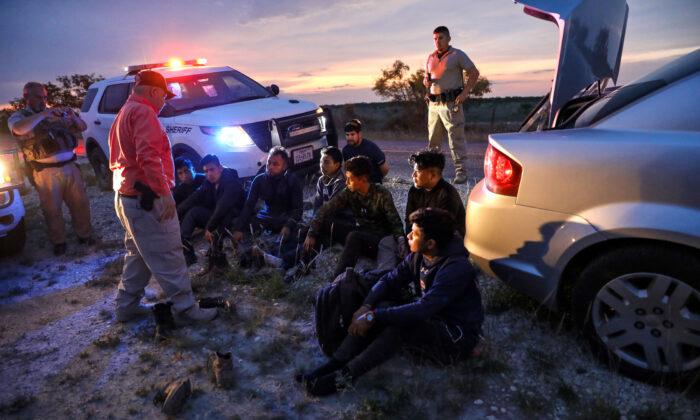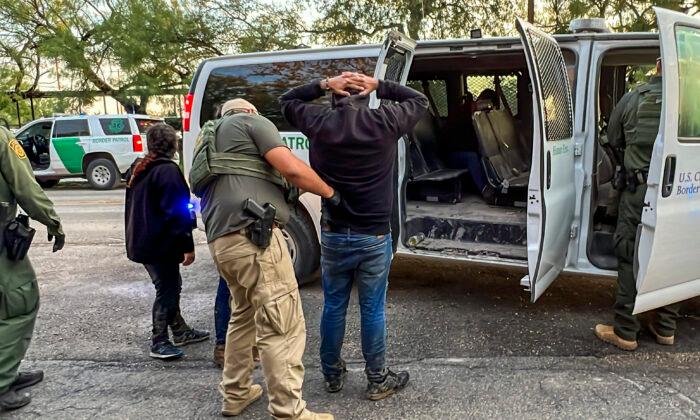KINNEY COUNTY, Texas—No one knows who they are, where they’re from, or where they’re going. But there are millions of them in the United States.
They are known as “gotaways”—illegal immigrants who evade U.S. Border Patrol and law enforcement by any means necessary and end up all over the United States.
Since January 2021, Border Patrol has recorded at least 1.7 million known gotaways at the southern border. Agents have no way of knowing how many they didn’t detect—by camera or footprints or in person.
“You can safely assume that anybody that went through the extra effort to avoid U.S. Border Patrol was not an asylum-seeker by default,” former Border Patrol chief Rodney Scott told The Epoch Times. Mr. Scott served during the Trump administration and for the first eight months of the Biden administration
The American public is used to seeing images of groups of people, including families, who cross the border illegally and give themselves up to Border Patrol. Since the beginning of 2021, border agents have apprehended more than 6.7 million of these people. This population is mostly known as asylum-seekers—and, whether or not they actually apply for asylum or are eligible, they’re often released into the United States.
“The cartel pushes across the asylum-seekers, they overwhelm Border Patrol, basically pulling all their resources,” Mr. Scott said. “They have scouts out watching every part of the border, they figure out which sections of the border are now vacated. And then that’s where they push through the people who do not want to surrender. Those are going to be the potential terrorists, the criminals, people who have been deported before, the real threat to the U.S.
“There are hundreds and hundreds of miles of border right now as we speak that are completely unpatrolled because Border Patrol is overwhelmed with processing these ‘asylum-seekers.’”
In deep southwest Texas lie small counties that have become thoroughfares for gotaways—both on foot and in vehicles—who are trying to circumvent the Border Patrol checkpoints that are set up on major highways up to 60 miles from the border. In most cases, if a gotaway can get past those checkpoints, they’re unlikely to be caught by law enforcement.
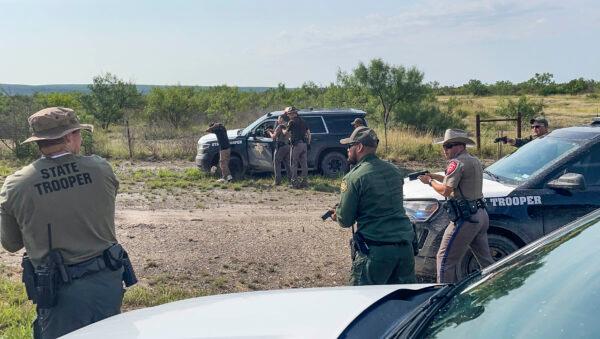
‘All Preventable’
Texas’s Kinney County only shares 16 miles of border with Mexico, but it’s situated in such a way that it’s become a thoroughfare for illegal immigrants to reach the relative safety of San Antonio before traveling to their final destinations.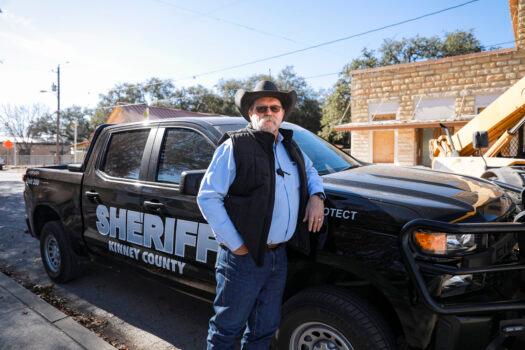
Kinney County Sheriff Brad Coe said that several years ago, his deputies would catch one or two carloads of illegal immigrants being smuggled per month. Now, he’s hitting highs of 95 vehicle loads per month. Thousands more are on foot, walking through local ranchland to avoid getting caught.
“We’re going to do what we can to stop them. I mean, A, it’s against the law. B, I can’t, in clear conscience, just sit back and do nothing, while these people get into Oklahoma City or Kansas City or Detroit, or whatever, and commit some type of heinous crime,” Mr. Coe told The Epoch Times.
“It may not be today, it may not be tomorrow, but somewhere down the road, if somebody rapes and kills somebody, and we find out that they came through here on my watch—that’s unacceptable.”
Prior to becoming sheriff in 2017, Mr. Coe was a Border Patrol agent for 31 years, based in Brackettville, Kinney County’s main city of around 1,800 people. As sheriff, he has overseen the consequences of the most dramatic increase in illegal immigration in his lifetime.
“Of course, every administration, every time we’ve had a presidential election, we’ve seen an uptick in illegal immigration, because there’s always that dream that there’s going to be a blanket amnesty,” he said. “Now that Biden’s here we’re seeing ... something I’ve never seen in 37 years. And we’re gonna pay the price for what’s going on now.”
During his 2020 presidential campaign, candidate Joe Biden said he supported free health care for illegal immigrants, a blanket amnesty for illegal immigrants already in the United States, and an easing of deportations.
On his first day in office, he halted border wall construction, reversed the ban on travel from terror-prone countries, suspended deportations of illegal aliens, stopped adding illegal immigrants to the “Remain in Mexico” program, strengthened the DACA program for children who were brought over illegally, and released a sweeping immigration package to Congress that included amnesty for millions of illegal immigrants.
Mr. Coe said the gotaways paying to be smuggled through his county aren’t asylum-seekers.
“They’re far from asylum-seekers. We’re getting a little of everything. We’re catching sex offenders, murderers, people who have been deported for various heinous crimes,” he said.
During a stop with law enforcement in the county, The Epoch Times witnessed a couple from Oklahoma transporting six illegal immigrants from the border toward San Antonio. It was later discovered that one of the men, from Colombia, was wanted in the United States for child sex crimes.
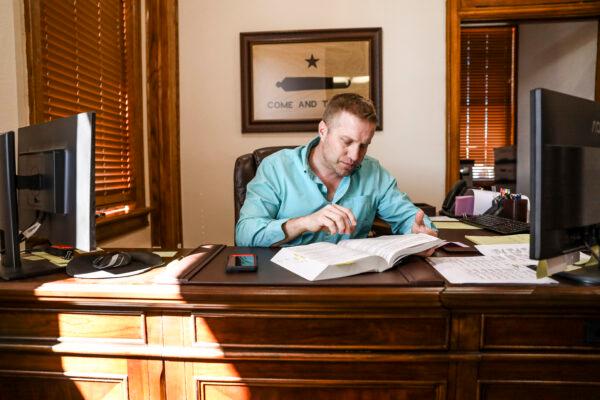
Kinney County Attorney Brent Smith said his county is doing what it can to prosecute illegal immigrants for breaking state laws.
“The one thing that’s very unique about border crime, and deaths related to the border, is that they’re all preventable,” Mr. Smith told The Epoch Times.
“If we had a secure border, every single ... illegal alien that murders someone—that could have been prevented [because] they wouldn’t have been here in the first place.”
In April 2021, Mr. Smith drafted a state-of-disaster declaration for Kinney County. That inspired dozens of other Texas counties to follow suit, and by the end of May, Texas Gov. Greg Abbott declared a state of disaster and launched Operation Lone Star—a way for small counties to get the resources they needed to beef up their response to the border crisis.
Mr. Smith, whose office used to handle four to five cases per month before 2021, has relied on Operation Lone Star resources to ramp up its prosecution ability.
“Every issue that we face has to do with the volume. A criminal trespass case is pretty simple. Were you on the property? Yes or no? Did you have permission to be there? Yes or no? But when you have 5,000 of them, all of a sudden, it’s complicated,” he said.
Mr. Smith’s office has prosecuted more than 5,000 people for misdemeanors committed in the county, including trespassing and evading arrest, since August 2021. All but about 20 were illegal immigrants, he said.
“The problem with Operation Lone Star is, it’s not securing the border, it’s addressing the side effects of an open border,” he said.
“To many ranchers in Kinney County, Operation Lone Star is the only thing standing between them and an open border.
Texas Ranchers
Local ranchers whose land sits between the border and Border Patrol highway checkpoints have been experiencing huge increases in illegal immigrants walking through their properties.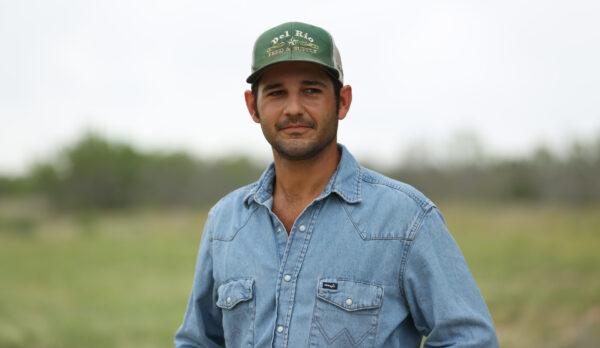
Mr. Hill said he’s dealt with illegal aliens traversing his land for years, but only at the rate of around 25 people a year, on average; sometimes, months would go by with no activity. Since 2021, however, he said it’s been constant.
On Jan. 20, 2021, Mr. Hill’s dog alerted him to a man on the front porch dressed head to toe in camouflage clothing.
“It obviously alarmed me. I’ve had plenty of encounters with illegal aliens over the past 10 or more years, but I’ve never had one that close to the house,” Mr. Hill told The Epoch Times. “I stopped him. I told him to backtrack and get away.”
He also called Border Patrol but doesn’t know whether they caught the intruder.
“That was just kind of the beginning of this giant snowball that’s occurring,” he said.
The next encounter happened about three weeks later, when Mr. Hill and his oldest son were working out on the ranch. His wife frantically called to tell him that a group of illegal immigrants had surrounded the house.
“They’re looking into windows, they’re at the back door, they’re at the front door, they’re banging on the walls, everything,” Mr. Hill said his wife told him.
He raced home and found one man on the front porch, while the rest had hidden as his truck approached.
“I made it pretty quickly to the individual on our front porch, I got him off the porch, and I promptly escorted him out of the yard,” Mr. Hill said. He eventually cleared the rest of the group out of his garage and sent them away.
Again, he called Border Patrol, but it took agents more than an hour to get there.
“Luckily, I was able to get home quick enough to stop anything from happening. It’s a very scary situation knowing that we’re this far out. We shouldn’t have any trespassers on our property, we are way out in the middle of nowhere,” Mr. Hill said.
“We’ve just been kind of cast to the wolves, and we’re just left to deal with this problem, because nobody else wants it.”
Wayne King, the manager of a large exotic game hunting ranch in Kinney County, said illegal immigrants walk through his property “like it’s a highway.”
“I have been woken up at night at 11, 12, 1 o'clock in the morning with them banging all over my doors, my windows. I’ve had to use my pistol to run them off,” Mr. King said during a Texas state Senate field hearing.
“It’s become a dangerous, dangerous thing to live every night of your life wondering. I sleep with pistols under my pillow, pistols in every room, pistols on my nightstand. It’s just crazy. I live 25 miles from the nearest place; 911 doesn’t help me a bit.”
Christopher Roswell, whose family has owned property near the border for several generations, said the damage done to his property during the past two years adds up to a little over $200,000.
“What I have witnessed over the last two years has been completely insane. We have been cussed at, threatened, had rocks and sticks thrown at us. Our dogs have been beaten on multiple occasions by illegals,” Mr. Roswell said during his testimony to the Texas state Senate border committee.
“Every hunting camp I have has been vandalized. Our headquarters have been broken into. Over half of our highway gates have been run through. We’ve had three electric gates destroyed. Most of my hunting blinds have been vandalized—windows and doors broken, one set on fire, several used as bathrooms.”
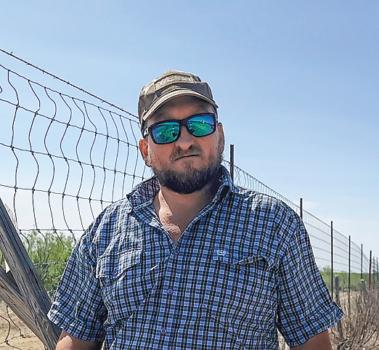
manager for a ranch in Maverick County, Texas. (Charlotte Cuthbertson/The Epoch Times)
Ben Binnion, a wildlife biologist and general manager for a ranch in Maverick County, said he’s moved his family off the ranch for safety reasons.
“My wife didn’t want to have to kill somebody in self-defense, inside our house, in front of our children,” he told The Epoch Times.
“If they’re breaking into your house to get water or they’re breaking into your house to cause harm to you, how would you handle the situation, because you don’t know which one they’re coming to do.
“You can’t understand it unless you’re out here seeing it every day, seeing the impact on the environment, seeing the impact on the locals, the local ranchers.”
Mr. Binnion said that during his first year on the ranch in 2014, he kept notes and recorded that Border Patrol apprehended about 37 individuals on his property.
“I’m getting 200 people a night on average on my trail cameras for two years solid now,” he said.
“Out here, if you see people walking through the brush, they’re breaking the law—100 percent guaranteed—because they’re on your property without your permission.”
Mr. Binnion said he has encountered illegal immigrants from Congo, Uzbekistan, Pakistan, and China, as well as Honduras, Guatemala, El Salvador, and Mexico.
“A lot of them that are walking through are trying to get to San Antonio or Houston as a way to get somewhere further,” he said.
“I’ve [met people] wanting to go to New York, Chicago, Philadelphia. We have met a few that go to Denver and then Seattle.”
During 2022, Mr. Binnion found 21 bodies on his ranch; one was discovered while he had one of his young children with him.
“I don’t want to have to explain to a 4-year-old why there’s a dead person laying in the middle of nowhere on our property,” he said. He doesn’t allow his children to ride around on the ranch with him anymore.
Financially, the damage done to his property has added up to about $300,000 over the past two years.
“And that is simply putting a bandaid on a bullet hole. That has nothing to do with replacing anything. If we were to replace everything, it'd be $800,000-plus,” Mr. Binnion said.
He said he’s had to hire a full-time employee to spend 40 hours a week fixing fences and picking up trash—“that’s literally all he does.”
“There’s just endless streams of people coming over,” he said. “I don’t know what the future holds. I don’t know what we’re going to do. Something has to change.”
Mr. Coe said the sheriff’s office has placed some cameras around Kinney County. In the first six months of 2023, the cameras detected more than 29,000 illegal immigrants walking into the county.
“To our knowledge, none have been apprehended, and their whereabouts today are unknown,” the sheriff’s office said.
“We have no clue who they are, or where they’re going. That’s the scary part,” Mr. Coe said. “They’re walking in broad daylight, most of them, and unhindered. The odds are with them that they’re not going to get caught.”
Mr. Coe said one local rancher has 3,000 acres leased that he can’t use because illegal immigrants keep cutting the fence.
“They’re not just cutting a hole to walk through, they’re cutting it from post to post. You’re talking about a 20-foot section of fence, gone,” he said.
“Can’t put cattle in there, can’t put deer in there, can’t have hunters come in. He’s got $9 million worth of property that he can’t use.”
Mr. Smith said as the stories of property damage, trespassing, and assault kept mounting, he hoped the federal government would step in.
“But they didn’t,” he said.
Lured on Social Media
The illegal aliens being smuggled by car are often driven by Americans, who are lured by the promise of quick and easy cash.Ads on social media, especially TikTok, entice would-be smugglers with videos of wads of cash and the seemingly simple task of giving a few people a ride.
“They’re promising all this money. We’re going to pay you $2,000, $5,000. When you’re 16, 17, 18 years old, it’s a lot of money,” Mr. Coe said.
“They come down, they pick up 10, they think it’s gonna be an easy $30,000. We’re seeing everything. I mean, young kids, old people. We had a retired couple, they were in their 60s, trying to make ends meet, according to them.
“Now, we’re getting people out of Ohio, Washington state, Illinois, flying in, picking up a rental car, coming to the border, trying to make quick money. And they’re getting caught.”
Human-smuggling arrests by Kinney County sheriff’s deputies have quadrupled over the past three years.
In 2020, the deputies made 169 arrests for human smuggling in the county. In 2022, they made 741 arrests, and so far this year, Mr. Coe said it’s already beyond 500. The numbers don’t include the additional arrests in the county made by Border Patrol agents or Texas state troopers.
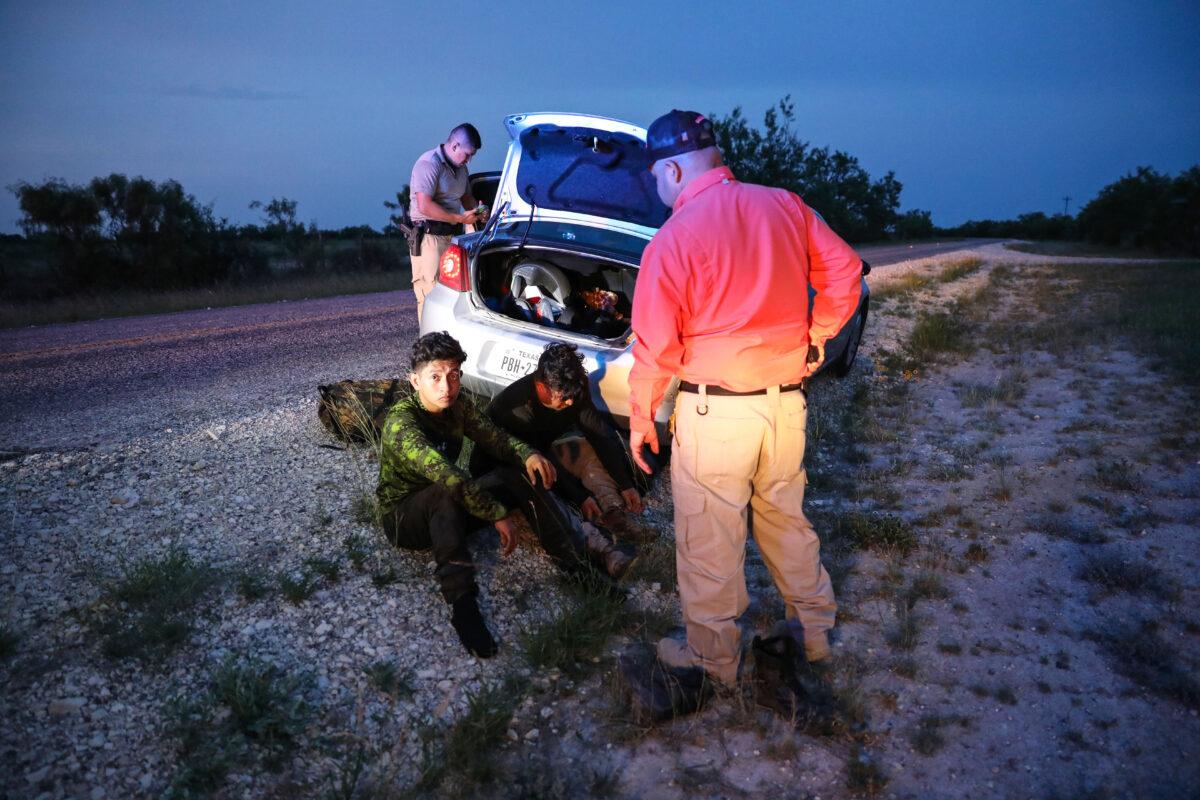
The new law also raises the degree of felony if pecuniary gain is proven, if a smuggled person is a minor, or if the smuggler has a firearm.
Mr. Abbott has said he supports a five-year mandatory sentence for smugglers. However, the state legislature hasn’t yet approved such a bill.
“The smugglers, they’re going to do whatever they can to get away,” Mr. Coe said. His deputies are often involved in high-speed pursuits as suspected smugglers try to out-drive them.
“We ended up in a pursuit, like we had last week, four people were killed right there. All because the driver didn’t want to stop.”
In another incident, a local woman was shot at by an alleged smuggler trying to shake law enforcement off his tail.
“To try to get away from law enforcement, he began shooting at oncoming traffic, striking her vehicle several times and forcing her off the road, hoping the DPS would stop the chase,” Mr. Smith said, referring to Texas Department of Public Safety troopers.
“That’s another example of what an open border looks like.”
It’s difficult to move in Mr. Coe’s evidence room. Stacks of white boxes with names written on the edge fill the shelves and rise from the floor in large stacks.
The boxes contain handguns seized by deputies over the past 18 months. The shotguns and ARs rest against a wall.
“Every Monday morning, I’m processing guns. And it’s not just the little Saturday Night Specials. We’re talking Glock, we’re talking Sigs, we’re talking Springfield .45s, we’ve got an AK-47, we’ve got a couple of AR-15s. We just got a shotgun over the weekend,” Mr. Coe said.
Impact on EMS
Between the road crashes, the trains, and the unforgiving southwest Texas weather, the Kinney County ambulance service spends almost two-thirds of its time and resources on the illegal immigration issue.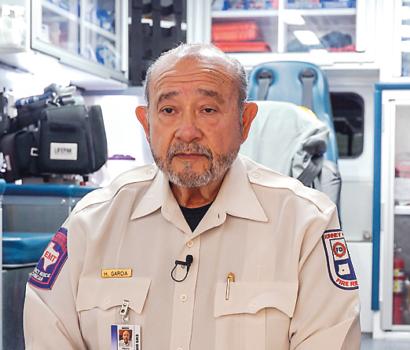
medical services for the Kinney County, Texas. (Charlotte Cuthbertson/The Epoch Times)
“There’s been some ugly, ugly stuff that has happened,” said Henry Garcia, director of emergency medical services for the county.
“We’ve had some very serious accidents where people ... you have them piled in in this vehicle and you start rolling over, there are bodies flying all over the place.”
One of the worst rollover crashes that he’s had to respond to so far involved 11 patients scattered at the scene after the driver lost control of the vehicle at speeds of more than 100 miles per hour on a stormy night. Mr. Garcia used both of his ambulances and had to call two more in from Uvalde and three from Del Rio to assist.
Freight trains traveling from the border are another common method for gotaways to get to San Antonio. They usually get on the train on the U.S. side of the border and hide in grain hoppers, or even inside brand new vehicles that are being imported within containers.
Mr. Garcia said he was called out a few months ago for a person who had slipped while jumping off the train and had his leg amputated at the knee by the train.
Other cases involve illegal immigrants sleeping on the tracks and not hearing an oncoming train.
“The myth is that if you’re going to sleep on the railroad tracks, get between the rails, because the snakes won’t come over the metal,” Mr. Garcia said.
He said this myth has resulted in several fatalities.
“If the conductor doesn’t see you, there’s no reason for them to sound their horn,” he said.
Mr. Garcia has one ambulance crew on deck at all times, and often a local volunteer firefighter or a deputy will be pulled in to drive a second ambulance if it’s needed.
If an illegal immigrant complains of an injury, Border Patrol won’t take the person into custody until he or she has been medically cleared, Mr. Garcia said.
“If it’s medically involved, we get paged out. I run the whole spectrum: from calls that are worthless to very, very serious calls,” he said.
“The one that really irritated me—we went 48 miles. The call came out as a laceration on his hand. The person had scraped their hand, not even broke the skin, but scraped their hand on barbed wire while they were trying to jump the fence, and complained that they'd been injured. Ninety-mile round trip.”
Mr. Garcia said local county residents have had to wait for emergency care or for transport to the hospital because the ambulance crews are tied up with illegal immigrants.
Prior to 2021, Mr. Garcia said he'd get about 250 callouts per year at the highest point. During 2022, his agency received almost 600 callouts.
“It’s not to say we didn’t have immigration issues three, four years ago; it was just not as prevalent,” Mr. Garcia said.
The county is out of pocket by more than $70,000 and counting, due to unpaid bills by illegal immigrants.
“In these immigration situations, I would say if we recover 25 percent of the cost, we consider ourselves lucky,” he said.
He sends outstanding medical bills to Homeland Security for reimbursement, “but it comes back ‘not eligible,’ and so it ends right there.”
The remoteness of the area, combined with the high number of catastrophic injuries, means a helicopter is often called out to whisk the injured to a San Antonio hospital.
Mr. Garcia estimates the air ambulance costs can total up to $90,000, depending on what medical care is needed on the way.
He gave an example of an illegal immigrant who suffered a snake bite while walking through ranchland. The ambulance responded, and medics administered one vial of anti-venom, which is all they carry. The helicopter arrived, and by the time it flew out and landed at the hospital, the air medics had administered 18 more vials of anti-venom. Each vial costs $1,500, which added up to $28,500 of anti-venom used.
“We ate the bill as far as what we did. The air ambulance ate their bill, because they’re in the same situation we are—they don’t have anybody to bill,” Mr. Garcia said.
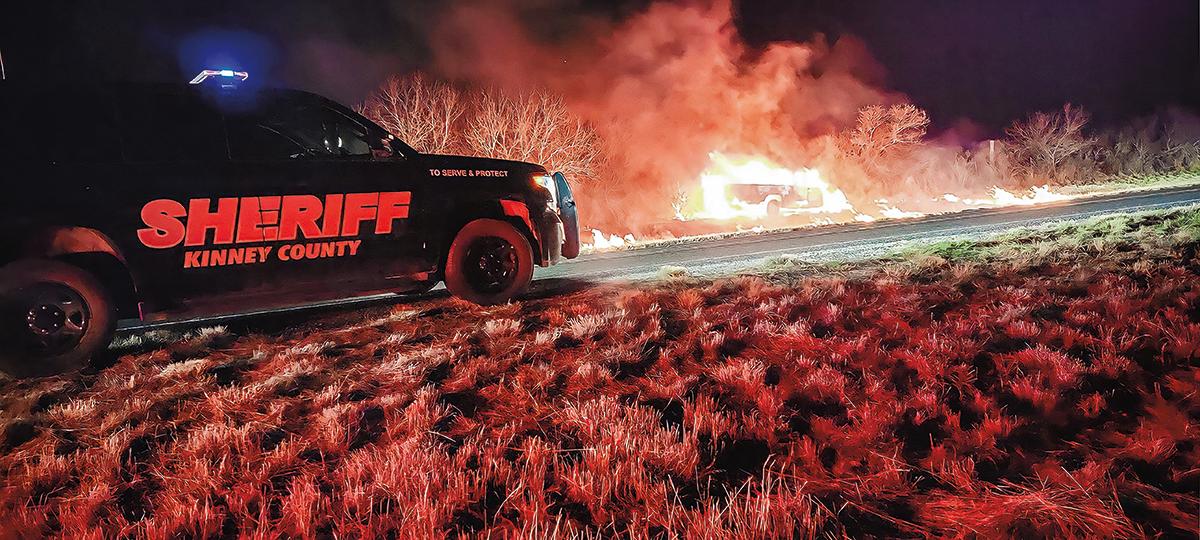
School Lockdowns
The local school campus in Brackettville is home to the town’s elementary, middle, and high schools, with a total of 571 students. The campus is located along one of the busiest smuggling routes in the county, and although deputies avoid turning on their lights or sirens until they’re past the school, it doesn’t always happen so smoothly.“It is not uncommon for us to go into a shelter-in-place at least once a week. And unfortunately, even when it is just once a week, it may be multiple times during the day,” said Eliza Diaz, Brackett school district superintendent.
“At that point, students and staff are not allowed to leave their buildings until we get the all-clear.”
The school district has spent $60,000 to place large boulders between the road and the school buildings to ensure that no cars plow into a building during a chase.
The school has also added perimeter gates, badge readers to access buildings, and panic buttons in classrooms.
“We’ve added some signage letting people know that we are a school that has a guardian program, [and] we do have staff members that are armed,” Ms. Diaz said.
“I would say over the last two years, instead of seeing it get better, it’s actually gotten a little worse. You can’t help but be concerned about the what ifs, what time is it going to happen next time? Where are students going to be?”
On several occasions, bailouts have occurred near the school, and vehicle occupants have tried to get into school buildings. A bailout is when a driver who is trying to evade law enforcement stops and all occupants flee in different directions.
In Kinney County, many residents have signed up to receive alerts on their phone from the sheriff’s office when a chase or bailout is occurring near town.
Last Christmas Eve, a law enforcement pursuit ended in a bailout near a Brackettville community. While absconding, at least one occupant shot at law enforcement.
“All occupants are considered to be armed and dangerous. Stay indoors and keep all doors and vehicles locked,” states the alert from the sheriff’s office.
Alerts are sent out several times a month, but not for every situation encountered.
An alert from June 9 states: “Texas DPS attempted to stop a vehicle on US 90 west when the driver of the vehicle intentionally went off the roadway. At this time, the occupants all absconded onto a ranch. It is unsure how many [illegal immigrants] ran from the vehicle.”
Many locals, as soon as they hear a helicopter, quickly go inside and lock their doors and windows. A helicopter usually denotes a search for fleeing smugglers and illegal aliens.
In one case, in the middle of the day, a block from the school, a vehicle being followed by a deputy turned up a side street and stopped. The dashcam footage shows the occupants bailing out and fleeing, but the deputy was able to apprehend the driver. Law enforcement officers always try to catch the driver, at the expense of others getting away.
Several of the occupants weren’t caught; however, a local homeowner with a security camera called the sheriff’s office the next day after noticing a man ducking into their shed.
The man was apprehended, and law enforcement identified him as one of the people who had jumped out of the car the day before.
Mr. Smith said the man was charged with criminal trespass and evading on foot.
“They always run, they don’t ever just surrender. So you tack on evading law enforcement to the charge. Usually, there’s more than one crime that’s being committed when an apprehension or an arrest is made. And so it’s usually evading arrest, criminal trespass,” he said.
“And so, prosecuting them for two different criminal charges is better, obviously, than one, if you want to create a deterrent.”
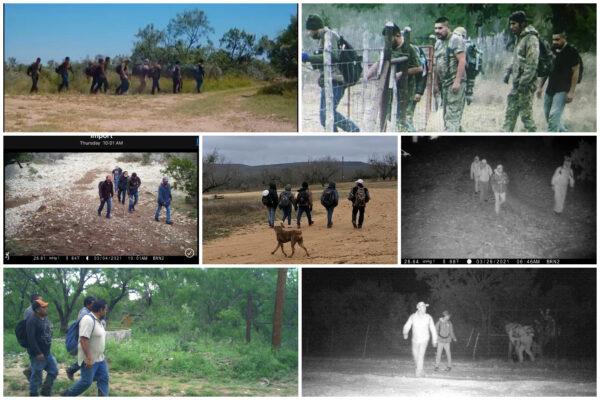
Jail Issues
Mr. Coe’s decades-old jail has space for 14 inmates, but most of the time now, it’s shut down.“It’s old, it’s falling apart. We’re trying to keep it patched together. I’m having to spend money to try to keep it open,” Mr. Coe said.
He’s had to file charges at-large for dozens of smugglers due to a lack of jail space, especially for women and 17-year-olds (who Texas treats as adults).
Once Operation Lone Star was up and running, the state made available in August 2021 about 6,000 male-only beds for alleged smugglers and illegal immigrants who were arrested for state crimes.
But it still couldn’t take females or 17-year-olds.
“So I have to either A, cut them loose, or B, try to find a place to put them. And that’s very difficult with women. Very, very difficult,” Mr. Coe said.
He said deputies have to release females who are arrested for smuggling and file the charges at large. If a grand jury agrees to indict, a warrant is then issued for the woman.
If the woman is then stopped somewhere for a traffic violation, the law enforcement officer will see a warrant alert for her.
“They call us, ‘Hey, we’ve got Jane Doe here. She’s wanted for smuggling out of your county.’ I still can’t take her because I don’t have a place to put them,” Mr. Coe said.
He said once smugglers learned that the county had no space for female inmates, the number of female drivers increased.
Everyone Has to Pay
Illegal immigrants have to pay cartels or smuggling organizations to get across the U.S. border, and it costs more as a gotaway to get farther into the United States.A Mexican national told The Epoch Times that he paid $4,000 to get to San Antonio. Another group of Mexican nationals said they had paid $5,000 each to get to Dallas, where they had planned to pay off their debt by working in the construction industry.
“It’s indentured slavery. They’re gonna have to pay that back sometime. And a lot of them don’t have a choice. ‘This is going to be your job, you’re either going to be a cook, you’re going to work in a sweatshop, or you’re going to work in the sex industry,’” Mr. Coe said.
He said his office picked up a Honduran woman recently who was in debt for $5,000 for her journey to San Antonio.
“Her final destination was supposed to be the East Coast, but she was going to be in San Antonio for a while, working, before she made her final destination, which was going to cost her another $5,000,” Mr. Coe said.
Smugglers often hold illegal immigrants at stash houses until their smuggling fees are paid, either by them or by their families.
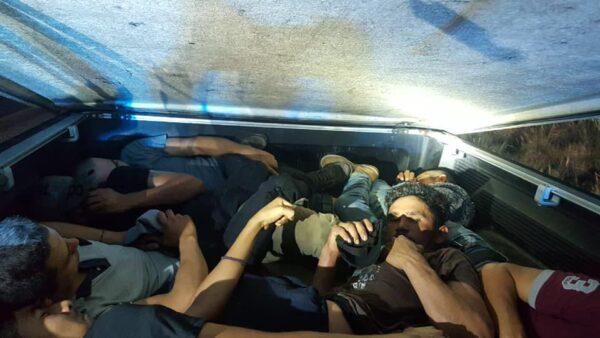
“They’re being abused on the way over here. They’re being abused once they get here. And they’re being abused when they hit their final destination,” Mr. Coe said.
The exploitation often starts south of the U.S. border. Two out of three migrants traveling to the U.S.–Mexico border say they experience violence along the way, including abduction, theft, extortion, torture, and rape, according to Doctors Without Borders.
“There are cases where the women—with the expectation of getting raped—prepare themselves by getting on birth control or taking birth control for the purpose of the journey,” said Marlene Castro, a Border Patrol supervisory agent.
The Jury Trial
The first and only local jury trial thus far under the Operation Lone Star border program wrapped up in Kinney County on May 9, 2022.The defendant, Honduran native Lester Hidalgo Aguilar, was charged with trespass, which was enhanced to a Class B misdemeanor, since he was found more than 100 feet inside the property line of an agricultural operation, and then elevated to a Class A misdemeanor, as the crime occurred during a declared state disaster.
Mr. Aguilar was found guilty, and the judge sentenced him to the maximum jail time of one year. The judge declined to apply an accompanying fine, which could have been up to $4,000, but said Mr. Aguilar should pay court costs ($290).
During sentencing, Mr. Aguilar admitted to a criminal history that includes a 1996 shoplifting charge in Omaha, Nebraska, buying cocaine in California in 2002, and conducting a home invasion in Florida in 1999.
Cheryl Gabler Tomlin, on whose family ranch Mr. Aguilar was arrested, testified at the trial, saying the property is fully fenced and no one was authorized to enter the property, where she raises cattle and goats.
After the trial, she told The Epoch Times she was satisfied with the outcome.
“I thought he would get off. I’m happy,” she said as she left the courtroom.
Ms. Tomlin said her life had changed considerably in the past year and a half as more illegal immigrants encroached on her land. She recalled one of her scariest moments when she was opening a fence to let her horses out while still astride her ATV. A man appeared, and she said he whispered, “Don’t tell, don’t tell,” and leapt over the fence toward her ATV.
She hit the gas, and he struck the side of the ATV and fell down. She waved down Border Patrol agents who were down the road looking for him. The agents arrested the man and later told her that he was a five-time aggravated assault felon from Honduras.
“I have a gun all the time now,” Ms. Tomlin said.
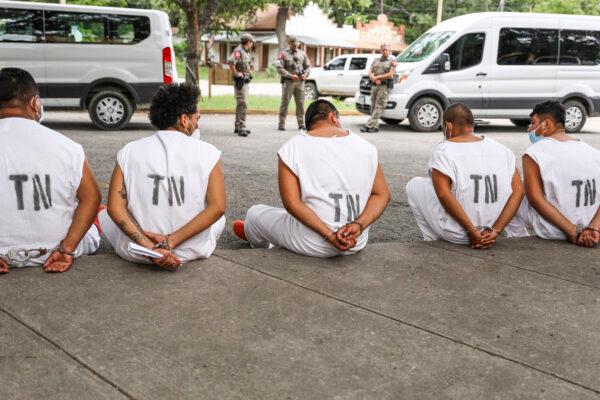
Failure to Appear
Prior to Mr. Aguilar’s trial, almost all illegal immigrant defendants had pleaded guilty or no contest to trespass or other misdemeanor charges, and had reached a plea deal of time served and no fine.After a misdemeanor arrest, Mr. Smith examines the evidence in the case file from the sheriff’s office or Texas state troopers. If it’s determined that trespass occurred, he’ll file a complaint against the individual for trespassing. The charge is elevated if the individual had a deadly weapon, the individual was found more than 100 feet past the property line on agricultural land, or if the alleged crime took place during a disaster.
Once charged, the suspect will make a plea, and if he pleads guilty, he’ll most likely get time in jail and be turned over to Immigration and Customs Enforcement (ICE).
It’s not a hefty penalty, but “we’re hoping they avoid our county,” Mr. Smith said.
The maximum punishment for a Class B misdemeanor in Texas is 180 days in jail and a $2,000 fine, whereas a Class A misdemeanor is one year in jail and a $4,000 fine.
However, at least 50 percent of the illegal immigrants bond out on cash bonds, Mr. Smith said.
“The problem is, they pay their cash bond to get released. And then usually they never show again. And so whether they’re in Mexico or another country, I don’t know, but they don’t show up for court,” he said.
“And so most of the cases are resolved either by plea deals or failure to appear in court.”
Mr. Smith said several illegal immigrants who were arrested and charged with trespass have since been arrested again in the county.
“There are two people in this entire situation that can solve this crisis. One is President Biden and the other is Governor Abbott. I do not believe President Biden is going to solve this crisis,” Mr. Smith said.
The Invasion Argument
Border Patrol has apprehended more than 6.7 million illegal immigrants along the southern border since January 2021, according to Customs and Border Protection data.Mr. Smith points to the Constitution to argue that if the federal government fails to protect Texas, then the state can take matters into its own hands.
Article I, Section 10 of the U.S. Constitution says a state can’t engage in war without the authority of Congress—unless it’s being actually invaded or in imminent danger.
Article 4, Section 7 of the Texas Constitution allows for the governor to use the state’s militia to repel invasions.
“A movement of people with tanks and bullets and planes would be an invasion. But in the Constitution, it has no restriction on what invasion actually is. It has no definition, except the plain meaning of the language. And the plain meaning of the language isn’t restricted to a military or a state actor. It’s anything that’s unwanted that’s causing danger to the Republic, or violating the sovereignty of another state or nation,” Mr. Smith said.
The barrier, along with concertina wire along the riverbank, has forced would-be illegal immigrants to turn back to Mexico or find another place to cross.
“Texas’s unauthorized construction of the floating barrier is a prima facie violation of the Rivers and Harbors Act. This floating barrier poses a risk to navigation, as well as public safety, in the Rio Grande River, and it presents humanitarian concerns,” wrote Todd Kim, an assistant attorney general, and Jaime Esparza, the U.S. attorney for the Western District of Texas, according to a July 20 letter obtained by The Epoch Times.
The governor blamed Mr. Biden and his policies for fueling a “tragic humanitarian crisis” at the border.
“His open border policies encourage migrants to risk their lives crossing illegally through the Rio Grande, instead of safely and legally over a bridge,” Mr. Abbott wrote on Twitter.
“We will continue to deploy every strategy to protect Texans and Americans—and the migrants risking their lives.”
Troopers have made more than 31,300 criminal arrests, with reports of more than 29,100 felony charges brought related to the border crisis, the governor’s office states.
Additionally, Texas law enforcement has seized more than 422 million lethal doses of fentanyl during Operation Lone Star.
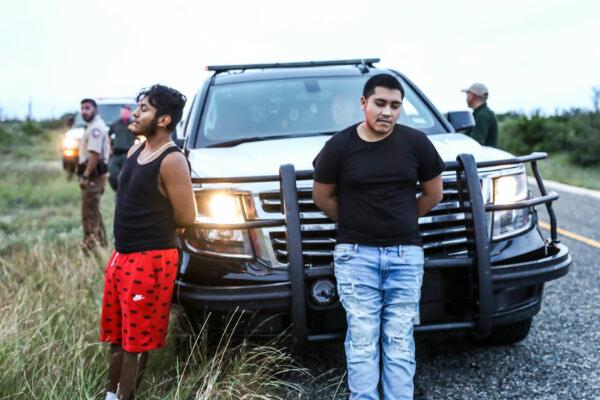
‘It’s Only Going to Get Worse’
Mr. Smith said he’s concerned that county residents will stop relying on the government for safety and take matters into their own hands.“I hate that county residents may have to do that, to protect their families. It shouldn’t be up to them to have to do that,” he said.
“The underlying purpose of any type of government, whether it’s local, state, or federal, is to protect its citizens. And right now, both the state and federal government are failing to do that. And our one jurisdiction we have here, we’re trying to do everything we can to do that.”
Mr. Coe, the former Border Patrol agent, predicts that the border crisis will remain unabated for now.
“It’s only going to get worse,” he said, “because as long as they’re allowing the people to come in and make some bogus claim to asylum, they’re just going to keep coming.”
Mr. Scott, the former Border Patrol chief, spoke at a border security summit in Austin in 2022, where he asked the audience to think about their own homes.
“It can be an apartment, it can be anything else. Is it wrong to ask people to come to your front door of your home? Then why would it be wrong to ask people to come to the front door of our nation?” Mr. Scott said.
“At our national level, we have ports of entry—328 of them—that are established as our front doors. And we just ask everybody to go through that front door, period.”
